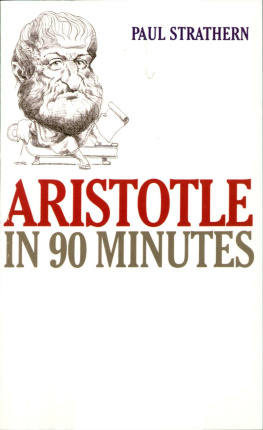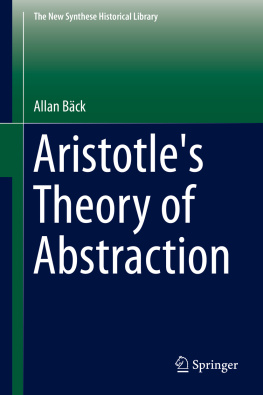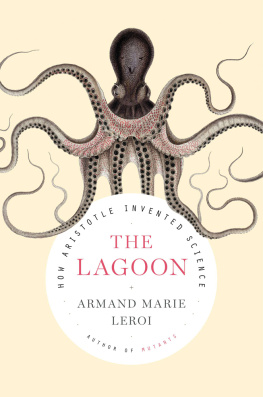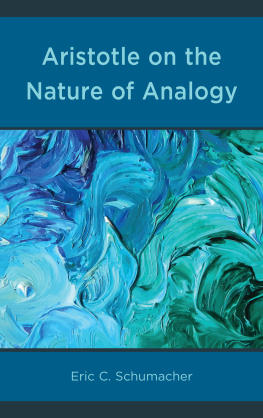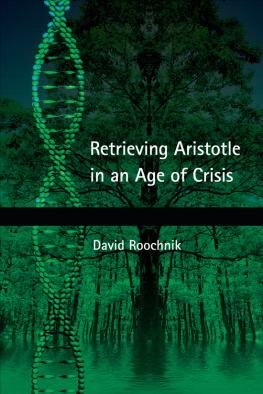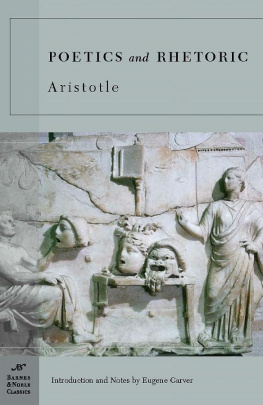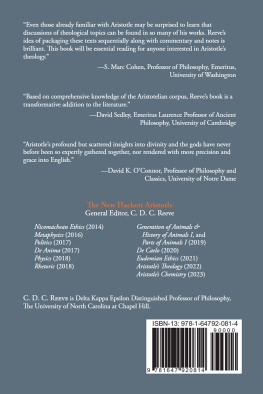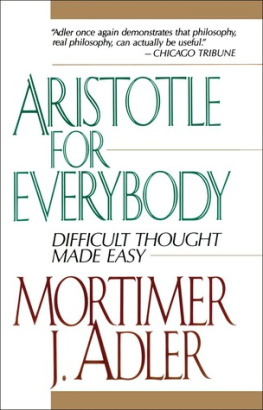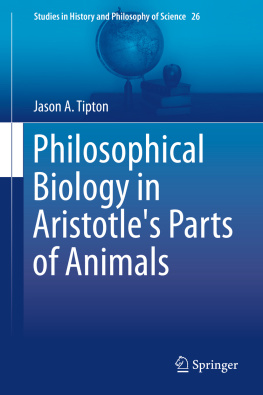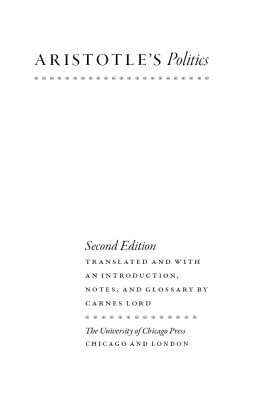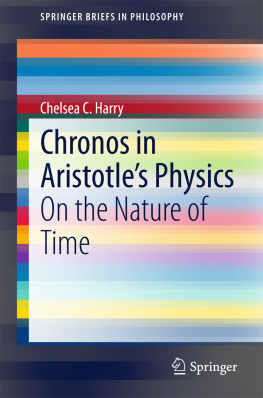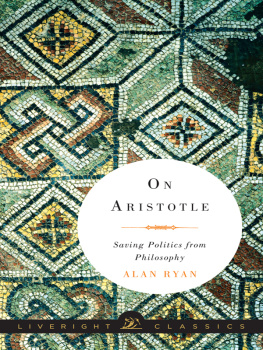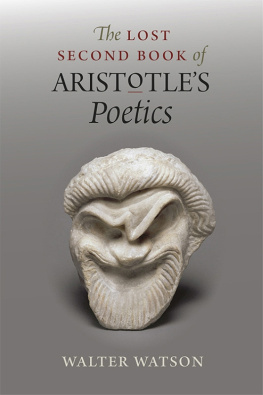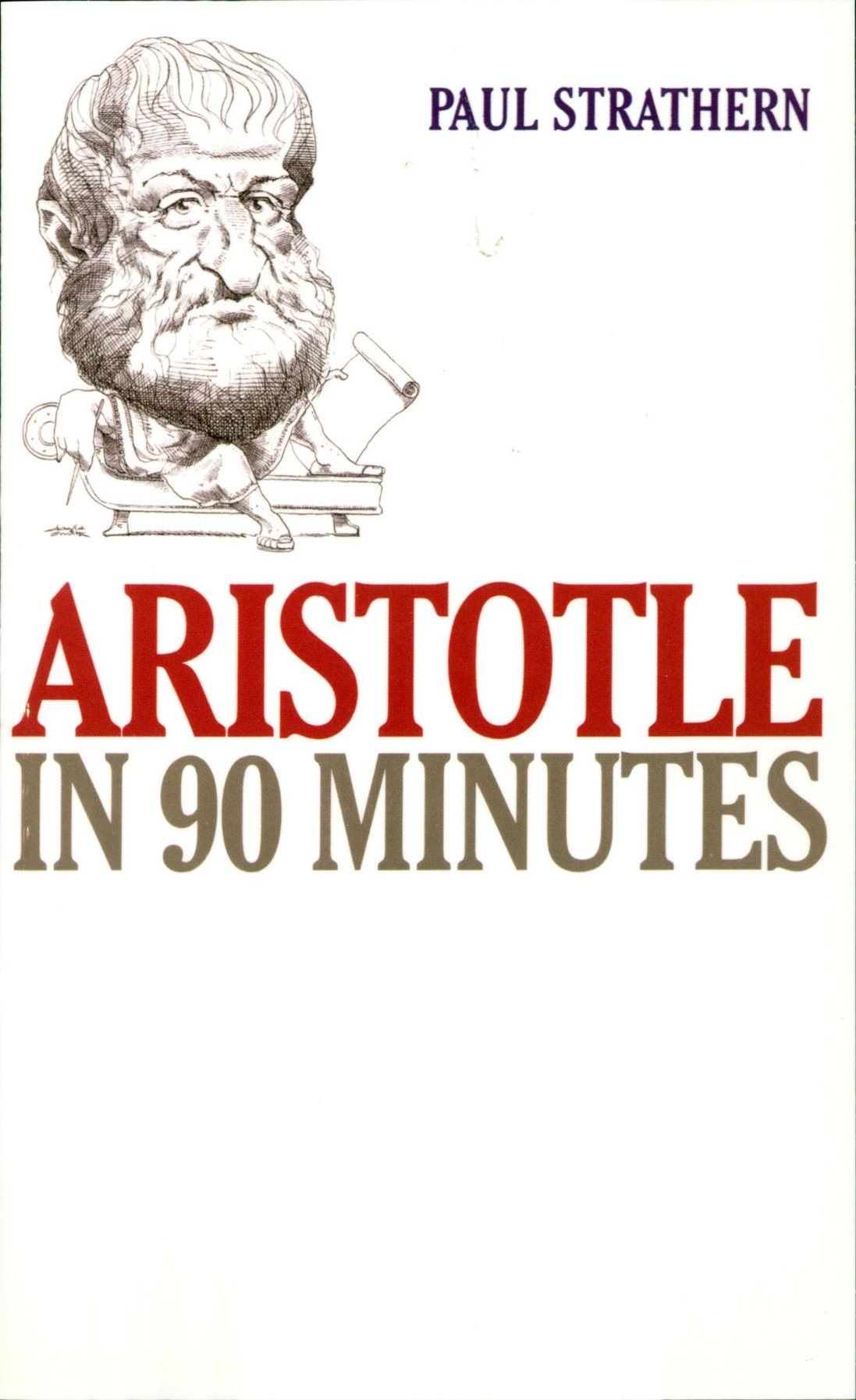Aristotles Life and Works
On a promontory above the village of Stagira, in northern Greece, stands a rather uninspired modern statue of Aristotle. Its expressionless face gazes out over the lumpy wooded hills toward the distant blue Aegean. Aristotles pristine white marble form, almost luminescent in the brilliant sunlight, wears a dcollet toga and sandals, bearing a slightly chipped scroll in its left hand. (This damage is said to be the work of a souvenir-hunting Argentinean philosophy professor.) Carved into the plinth in Greek are the words Aristotle the Stagirite.
Aristotle was born at Stagira, but despite the statue he wasnt born in the modern village of Stagira. According to the guide book he was born in nearby ancient Stagira, whose ruins are still visible. After my disappointing encounter with the statue, I set off to find the ruins. These were somewhere just down the road, I was told by a young Batman returning home from school. With a flourish of his black plastic cloak, he indicated the road to the coast.
After an hours sweltering walk down the long winding road, with the thunder rumbling ominously around the rocky hills above me, I was eventually given a lift to Stratoni, an eerie combination of deserted seaside resort and mining village. Ancient Stagira lay somewhere off the old road a bit farther to the north, I was told by a carpenter who was repairing the closed caf on the empty waterfront.
Few cars travel on this road in October, as I was soon to discover. And the autumn storms in this region, when they eventually break, can be severe. For an hour I sheltered beneath a narrow ledge of rock as the torrential downpour cascaded over the bare hillside with no sign of ruins or vehicles visible in the flickering, crashing gloom around me. Soaked to the skin, I raged to myself about the statue of Aristotle which had led me to Stagira, the wrong Stagira. It was nothing more than a fraud. The modern village of Stagira had no claim whatsoever to be known as Aristotles birthplace, apart from fortuitously sharing the same name. Why, by the same token they might just as well erect a statue of Joan of Arc in New Orleans....
Aristotle was born in 384 B.C. at ancient Stagira in Greek Macedonia. In the fourth century B.C. Macedonia was regarded by the ancient Greeks in much the same way as the modern French regard Britain and America. But Stagira was not beyond the pale of civilization. This was a small Greek colony founded by the Aegean island of Andros.
Aristotles father Nicomachus had been personal physician to Amyntas, the king of Macedon and grandfather of Alexander the Great. As a result of this connection, which had ripened into friendship, Aristotles father seems to have become a rich man, acquiring estates around Stagira and elsewhere in Greece. The young Aristotle was brought up in an atmosphere of medical learning, but his father died when he was still young. Aristotle was then taken to Atarneus, a Greek city on the coast of Asia Minor, where he was brought up by his cousin Proxenus.
Like many an heir to a fortune, Aristotle soon began spending his inherited cash in determined fashion. According to one story, he blew the lot on wine, women, and song and ended up so broke that he was forced to join the army for a spell. After this he returned to Stagira where he took up medicine. Then, at the age of thirty, he gave it all up and set off for Athens to study at the Academy under Plato, where he remained for eight years. Later medieval hagiographers, determined to turn Aristotle into a saintly character, tended to ignore or discount these unthinkable calumnies. And sure enough, there is another version of Aristotles early manhood. According to this rather more boring (but admittedly rather more credible) story, Aristotle went straight to the Academy at the age of seventeen. Yet even some of the sources for this story allude to a brief playboy interlude.
Either way, Aristotle soon settled down to a period of intense study at the Academy, quickly establishing himself as the finest mind of his generation. Initially he was a student, but he was soon invited to become one of Platos colleagues. It seems that to begin with, Aristotle worshiped Plato. He certainly absorbed all the Platonic doctrine that was taught at the Academy, and his own philosophy was to be firmly grounded in its principles.
But Aristotle was far too bright to be a mere follower of anyone, even Plato. When Aristotle discerned what appeared to be a contradiction (or, heaven forbid, a flaw) in the works of his master, he felt it his intellectual duty to point this out. This habit soon began to irritate Plato, and though they appear not to have quarreled, the evidence suggests that the two greatest minds of their age soon found it politic to maintain a certain distance. Plato is known to have referred to Aristotle as the mind on legs and to have called his house the reading shop. This latter remark referred to Aristotles famous collection of ancient scrolls. Aristotle was in the habit of buying up as many rare scrolls of ancient works as he could lay his hands on, and was one of the first private citizens to own a library.
The young academic evidently received a considerable income from his inherited estates and soon became known in Athens for his cultured manners and gracious (if rather scholarly) lifestyle. Tradition has it that he was a weedy fellow, with spindly legs, who spoke with a lisp. Perhaps to compensate for this he became a natty dresser, donning the latest fashion in sandals and togas, and adorning his fingers with tastefully jeweled rings. Even Plato, who was no pauper, envied Aristotle his library. Yet despite Aristotles comfortable and refined way of life, his early works (now lost) were mainly dialogues discussing the base futility of existence and the joys of the hereafter.
Aristotle had a natural inclination toward the practical and the scientific. This led him to view Platos ideas from an increasingly realistic standpoint. Plato believed that the particular world we perceive around us consists of mere appearances. The ultimate reality lies in a further world of ideas, which resemble forms or ideals. The particular objects of the world we perceive derive their reality only by partaking in this ultimate world of ideas. Thus a particular cat, such as the black one I can see lying on the chair, is only a cat because it partakes in the ultimate idea (or form) of cattiness; and it is only black insofar as it partakes in the idea (or ideal) of black. The only true reality lies beyond the world we perceivein this ultimate realm of ideas.

